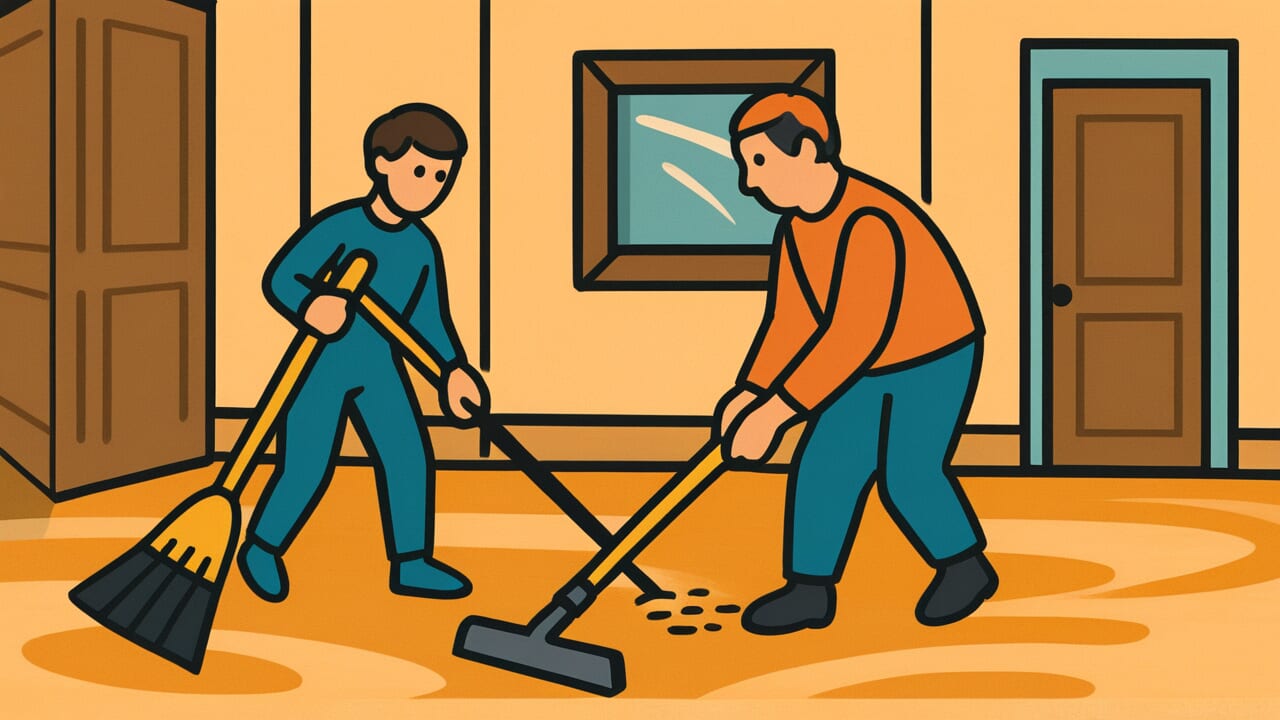How to Read “a new broom sweeps clean, but an old broom knows all the corners”
A new broom sweeps clean, but an old broom knows all the corners
[uh NEW broom sweeps kleen, but an ohld broom nohz awl thuh KOR-nurz]
Meaning of “a new broom sweeps clean, but an old broom knows all the corners”
Simply put, this proverb means that new people bring fresh energy, but experienced people have deeper knowledge.
The saying uses cleaning tools to make its point. A new broom has stiff bristles that sweep well. An old broom has worn bristles but knows where dirt hides. The “corners” represent the tricky spots that only experience reveals.
This wisdom applies everywhere in daily life. A new employee might work with great enthusiasm and fresh ideas. But a veteran worker knows the shortcuts, problems, and hidden challenges. Both bring value to any situation, just in different ways.
What makes this saying interesting is how it balances two truths. Many people think newer is always better. Others believe experience always wins. This proverb suggests both have their place and their strengths.
Origin and Etymology
The exact origin of this proverb is unknown, though similar sayings about brooms and cleaning appear in various forms across different cultures. The comparison between new and old tools reflects common human observations about work and experience.
Brooms were essential household tools for centuries, making them perfect symbols for everyday wisdom. People noticed how new brooms worked differently than old ones. This observation naturally extended to human behavior and workplace dynamics.
The saying likely spread through oral tradition before appearing in written collections of folk wisdom. It represents the type of practical observation that working people would share with each other. The proverb gained popularity as societies began valuing both innovation and experience in equal measure.
Interesting Facts
The word “broom” comes from the plant called broom corn, which was bundled together to make early sweeping tools. Before manufactured brooms, people made their own from whatever stiff plants grew nearby.
The phrase “sweeps clean” uses alliteration, making it easier to remember and repeat. This sound pattern helped the saying stick in people’s minds across generations.
The metaphor of “knowing the corners” reflects how cleaning was traditionally done by hand in every home. Everyone understood that corners were the hardest places to reach and clean properly.
Usage Examples
- Manager to HR director: “The new hire has great energy, but I’d still consult with her predecessor on this project – a new broom sweeps clean, but an old broom knows all the corners.”
- Daughter to father: “I know you want me to modernize the family business, but we should keep Uncle around as advisor – a new broom sweeps clean, but an old broom knows all the corners.”
Universal Wisdom
This proverb captures a fundamental tension in human progress between innovation and wisdom. Throughout history, societies have grappled with when to embrace new approaches and when to rely on proven methods. This balance affects everything from survival strategies to social structures.
The psychological appeal lies in how it validates both youth and age. Young people naturally bring energy, optimism, and fresh perspectives unburdened by past failures. Older individuals possess pattern recognition, understanding of consequences, and knowledge of what actually works. Both perspectives serve essential functions in human communities.
The deeper truth reveals itself in how knowledge accumulates differently than energy. Physical vigor and enthusiasm peak early but fade over time. Wisdom and understanding grow slowly through repeated exposure to challenges and their outcomes. The “corners” represent not just hidden problems, but the subtle complexities that only emerge through long experience. This creates a natural interdependence where neither pure innovation nor pure tradition alone can solve complex challenges. The proverb acknowledges that progress requires both the drive to improve and the wisdom to understand what improvement actually means.
When AI Hears This
Learning creates a strange trade-off that humans rarely notice. When people gain expertise, they lose their beginner’s blindness to “impossible” things. New workers attack problems veterans avoid because experience teaches limitations. Fresh eyes see solutions that trained minds have learned to dismiss.
This reveals how human knowledge works against itself in hidden ways. Experience doesn’t just add information – it rewires what people can perceive. Veterans know every corner because they’ve learned to see obstacles everywhere. Beginners sweep clean because they haven’t learned what can’t be done yet.
What fascinates me is how humans instinctively balance these opposing strengths. Organizations naturally cycle between fresh blood and old wisdom without planning it. This isn’t inefficiency – it’s brilliant adaptation to knowledge’s built-in blindness. Humans have evolved to need both the reckless energy of ignorance and the careful sight of experience.
Lessons for Today
Living with this wisdom means recognizing that both fresh energy and deep experience have irreplaceable value. The challenge lies in knowing when each approach serves best. Sometimes situations call for the vigorous action of a “new broom.” Other times, they require the nuanced understanding of an “old broom.”
In relationships and teamwork, this translates to appreciating what different people bring. Newcomers often see possibilities that veterans miss because experience can create blind spots. Veterans understand pitfalls and complexities that enthusiasm alone cannot overcome. The most effective approach combines both perspectives rather than choosing sides.
The broader lesson extends to how we view change in our own lives. We can embrace new methods and ideas while respecting the wisdom embedded in established practices. This means staying curious about innovation without dismissing the value of experience. It also means recognizing that as we gain experience, our role shifts from bringing fresh energy to sharing deeper understanding. The wisdom lies not in being either the new broom or the old broom, but in understanding what each moment requires and contributing accordingly.



Comments